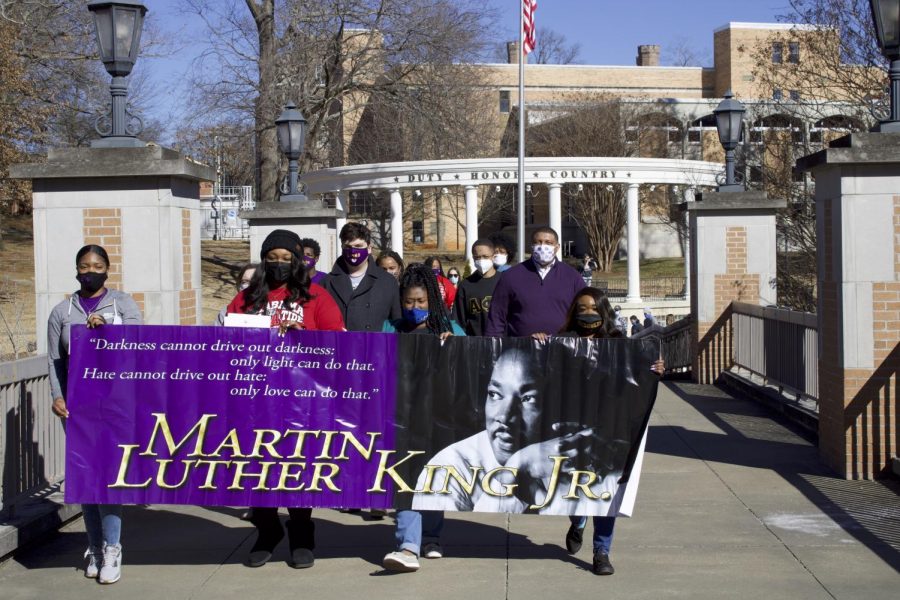Remembering the legacy of Martin Luther King Jr.
January 29, 2021
UNA honored the legacy of Dr. Martin Luther King Jr. with an annual remembrance march on Jan. 18.
The March began at the Wendell Walkie Gunn commons with opening remarks from Ron Patterson, vice president for diversity, equity, and inclusion.
“As we come together to celebrate Dr. King’s incredible legacy of service to all, this day echoes the importance to demonstrate unity and celebrate diversity and inclusion on our campus,” said Patterson.
“It is also a time to consider how much work still remains to fulfill Dr. King’s dream,” said Patterson. “Service to one another as a powerful act of strengthening our community.”
University President, Dr. Kenneth Kitts, also remarked on the importance of starting the day at the Wendell Walkie Gunn commons and the values of UNA’s campus.
“[Wendell Gunn’s] story becomes one of the most compelling I’ve heard in my three decades in higher education,” said Kitts.
“A young student breaks the color barrier, and enters a previously segregated college amid the turmoil of the civil rights era,” said Kitts.
Wendell Gunn was the first Black student to attend UNA in 1963. He was appointed to the Board of Trustees by Governor Kay Ivey in 2019.
“This story is a powerful commentary on Wendell’s life, and it is on the values of this university,” said Kitts. “It also serves as a great introduction to the topic at hand.”
Transitioning to King’s legacy, Kitts referenced King’s acceptance speech for the Nobel Peace Prize in 1964.
“In it he touched on the many problems that defined his era of systemic racism, discrimination, poverty, war, and the threat of nuclear annihilation,” said Kitts.
“It was a time of great uncertainty and our country was deeply divided, torn between two realities of who we are and who we want to be,” said Kitts. “Does that sound familiar?”
Kitts left the crowd with a famous quote from the acceptance speech that he believed was a powerful message of hope.
“I refuse to accept the view that mankind is so tragically bound to the starless midnight of racism and war that the bright daybreak of peace and brotherhood can never become a reality,” said King.
“I believe that unarmed truth and unconditional love will have the final word,” said King.
Ansley Quiros, a UNA history professor, spoke about the importance of King’s message in the “fierce urgency of now.”
Quiros explained that though she has spoken repeatedly about the struggle for Black freedom being ongoing, for her, that struggle takes on new meaning given the events of the last year.
“Over the past year, we have heard the unmistakable cries of injustice,” said Quiros.
“From George Floyd’s anguished sobs, to the footfall of Ahmaud Arbery, to the verdict given to Breonna Taylor, and thousands of peaceful Americans repeating ‘no justice, no peace,” said Quiros.
Quiros further explained that the U.S. is a nation that can no longer deny its own history in the face of a divided country.
Quiros also provided a famous quote from King.
“We can either choose chaos or community,” said King. “We can live as brothers or perish as fools.”
Quiros closed her remarks with a call to action.
“Get in the push. Write a letter, make a call, cast a vote, march, educate, work and pray, get into good trouble as John Lewis would say,” said Quiros. “We all must make a choice in the fierce urgency of now.”
Leading the march was the Black Student Alliance.
President Scelena Harris and Vice President Kee Johnson comment on King’s legacy and the future of the university.
Scelena Harris became the president of BSA this year.
“BSA for me is just wanting other students who look like me to be able to fellowship with other people that look like them,” said Harris. “To know they are not alone on campus.
Johnson became vice president in Nov. 2020.
“BSA to me means gathering people of color, or people who just don’t fit into the majority race on campus and bringing them together,” said Johnson.
“Making them more aware of problems or issues going around the world or even community,” said Johnson.
Johnson believes BSA is essential for a diverse campus.
“I think it’s important because everyone on campus isn’t the same,” said Johnson. “An organization where people can come together and build each other up.”
Harris and Johnson believe Martin Luther King’s legacy is important to uphold on campus.
“[His legacy] is everything, he died for our cause,” said Harris. “I wish he could be here today to see how much we have progressed. He started the movement for us to be here today.”
“His legacy to me means breaking boundaries and being peaceful,” said Johnson. “Not giving up on what he believed in and standing up for human rights.”
“I think it’s important on campus for more minorities coming to school here,” said Johnson. “No one wants to come to a place where they don’t feel like they fit in.”
The Martin Luther King Jr. remembrance march acted as not only a symbol of King’s lasting legacy but, the inclusive future UNA students and faculty are working to create.



